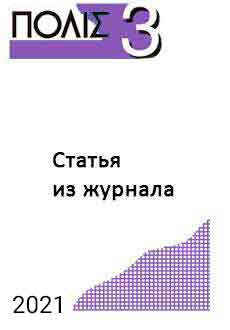Online shop of "Polis. Political Studies" Journal
We in the world, the world in us
Chernysh M.F., He Yijin Discourses of Social Justice In The Chinese and Russian Cultural Contexts. – Polis. Political Studies. 2021. No. 3. P. 111-128. (In Russ.).
150 руб.
Justice is regarded in classical works as a set of principles that apply to any society. This approach is taken by John Rawls who defines the main principles of justice on the basis of the so-called “incipient social position”. An individual isolated from the outside world, deprived of salient social characteristics, constructs anew a just social order. Amartya Sen subjected this approach to critique by claiming that perceptions of social justice can vary widely depending on the society and social group to which an individual belongs. The article assumes that social justice is embodied in a number of basic principles and practices that have both specific and universal content. This approach is bolstered by a comparison of the perception of justice in Russian and Chinese social thought. In ancient China, justice was treated as a necessary condition of a harmonious society. Across different times justice has been perceived in different ways: in the early works of Confucius, justice was regarded as full equality; in later works it was defined as distribution according to merit and the division of labor. In the Russian social thought, the concept of justice arose when the state embarked on the path of modernization and assimilated the ideas of equality and dignity inherent in it. The Russian and Chinese ideas of justice have a shared understanding of justice as a set of power relations dependent on the interaction between the monarch and his or her subjects. In both cultures, “the benevolence” of the monarchy and its ability to take care of its population is regarded as the most important condition of justice and the most important principle of social harmony.
Justice is regarded in classical works as a set of principles that apply to any society. This approach is taken by John Rawls who defines the main principles of justice on the basis of the so-called “incipient social position”. An individual isolated from the outside world, deprived of salient social characteristics, constructs anew a just social order. Amartya Sen subjected this approach to critique by claiming that perceptions of social justice can vary widely depending on the society and social group to which an individual belongs. The article assumes that social justice is embodied in a number of basic principles and practices that have both specific and universal content. This approach is bolstered by a comparison of the perception of justice in Russian and Chinese social thought. In ancient China, justice was treated as a necessary condition of a harmonious society. Across different times justice has been perceived in different ways: in the early works of Confucius, justice was regarded as full equality; in later works it was defined as distribution according to merit and the division of labor. In the Russian social thought, the concept of justice arose when the state embarked on the path of modernization and assimilated the ideas of equality and dignity inherent in it. The Russian and Chinese ideas of justice have a shared understanding of justice as a set of power relations dependent on the interaction between the monarch and his or her subjects. In both cultures, “the benevolence” of the monarchy and its ability to take care of its population is regarded as the most important condition of justice and the most important principle of social harmony.
 English
English Русский
Русский

Reviews
There are no reviews yet.